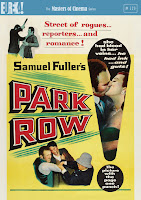
Rating:
PG
Release Date:
25th October 2013 (UK Cinema)
Distributor:
Eureka! Video, BFI
Director:
F.W. Murnau
Cast:
Max Schreck, Greta Schröder, Ruth Landshoff
It's easy to call yourself a film fan or even a cinephile but when you dig a little deeper to find out why they call themselves fans its then you truly find out how much of a fan you really are. Film is one of the most culturally diverse art forms ever created, true cinephiles will appreciate it in all it's forms including Silent Film. With Halloween creeping up on us what better time to (re-)release of the most iconic horror films in cinematic history getting a rare appearance on the big screen, F.W Murnau's Nosferatu (1922).
Whilst Bela Lugosi then Hammer Films romanticized that many of us perceive Dracula to be, the reclusive black cloaked fanged count who has women falling at his feet ,under his hypnotic spell, Murnau's masterpiece is film's earliest adaptation of Bram Stoker's novel seen on the big screen.
Set in post world war one Germany, Nosferatu sees Knock (Alexander Grauach) a estate agent and his assistant Hutter (Gustav Von Nagenheim) go on assignment deep into the mysterious Carpathian Hills in heart of Transylvania. They arrive at Count Orlock's castle (Max Schreck)to broker the sale of Orlock home back in Germany but as the days fly past Hutter starts to notice unusual things start to happen he reverts back to the book he is reading Orlock might actually be a vampire. As the horror of realization sinks into Hutter he discover Orlock has escaped his castle back to Germany amongst a shipment of coffins leaving a trail of death in his wake forcing Hutter to Hunt the parasitic killer before a veil of death destroys his hometown.
To be screened part of BFI's Gothic The Dark Heart Of Film,Nosferatu deserves its rightful place next to modern horror, frankly because of its superior quality. The film might be 9 years short of been 100 years old some may call it outdated, cliched but in reality this film's craftmanship, technical ability are second to none. This film is essential viewing for any wanna be horror filmmaker though scare factor maybe non-existent but the visual power and atmosphere stands up against any modern horror film making one of the best with the genre (possibly best within Vampire sub genre). The shadowy silhouettes, male leads exact doubles of each other, broody Gothic horror in its prime but most of all make up the symbolic German Expressionism.
If there's any case for the importance of music within a feature film, the silent film era will act as your best case to support your argument. Nowdays it seem many bands fight to get a hip points however like when you talk about football matches the crowd been the '12th Man' the score is that '12th Man' providing the heartbeat of the audience delivering an extra dimension of fear, tension. Even with a modern score Nosferatu never loses it's power still delivers the platform for Max Schreck to deliver the ultimate legendary performance as Count Orlock.
Schreck's portrayal of Orlock was delivered with such conviction, terrifying passion by an actor who actually believed he was a vampire. There is no comparisons from any other actor coming close to matching Schreck,but the closest comparsions could possibly be seen in two more recent films, the highly underrated Shadow Of The Vampire (2000) and Werner Herzog's Nosferatu The Vampyre (1979) with Klaus Kinski.
So why has Stoker's legendary creature of the night always been romantized rather been a predatory monester, one a argument comes from film historians with the possibe connections with Nazism. Whilst the film was created well before the rise of the Nazis Nosferatu is believed by some to be an account based around the Weimar Republic. A state within Post World War One Germany born out off corruption, anti antisemitism delivering the National Socialist Party but it's the visual attributes of Orlock that could be seen as the most terrifying. The Nazis looked to have hijacked Murnau's vision for how they symbolized the Jewish people as rat like creatures for their propaganda films. If anything the main argument could all be down to Bram Stoer's widow taking the German auteur to court for breach of copyright despite the change to the novel
Whatever your think about Nosferatu, it may not feel part of modern romantic vision of the vampire but it has it's rightful place in horror folklore. When you look back at the story of how Murnau's masterpiece was created it makes you wonder did he know something we didn't know when he kept that single copy despite the court order to destroy all copies. Though sometimes if he had a time machine he may have thought twice about destroying the remaining if he knew that Twilight Saga lay ahead?! Whatever you think or how many versions of the film you may have on DVD or Blu-Ray F.W Murnau's Nosferatu was made for one thing, that's the big screen, don't miss a piece of cinematic gold getting a rare run on the big screen.




















